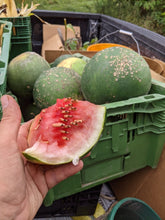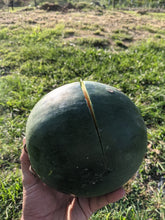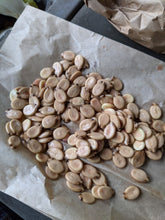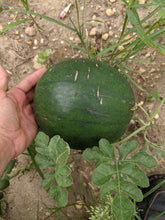'Small Jadu'i' Watermelon
Regular price
$5.00
Sale
Citrullus lanatus
Origin: Jenin, Palestine
Improvement status: Breeding population
Seeds per packet: ~16
Germination tested 12/2025: 90%
Life cycle: Annual
Jadu'i is a legendary watermelon variety from Jenin, the occupied Palestinian city in the West Bank. There was a time when Jadu'i watermelons (pronounced "jah-doo-AYE") were exported from Jenin by truck to Lebanon, Jordan, and Syria. Associated with ba'al agriculture (unirrigated, rain-fed farming), these watermelons were long known for their resilience, and beloved for their sweet, rich flavor, and large size.
According to the woman who introduced us to this plant, our dear friend Vivien Sansour of the Palestine Heirloom Seed Library, this watermelon is of deep importance to many Palestinian people. "Known for its disease resistance and adaptation to the microclimate," Vivien writes, "Jadu’i watermelon fields were symbolic of Palestinian farmers’ lived experiences: Palestinian women gave birth in the melon fields; many sought refuge in the fields during the war; and many more remember the times when the watermelons were stored under beds to eat during the winter. This watermelon has stayed carved in peoples’ memories until this day. There is no one from Jenin who would not have a story to share from their parents or their own experience of a once loved and enjoyed melon that shaped much of the culture at some point.”
But the disruption of Palestinian lifeways caused by the Israeli occupation and the ongoing cycles of violence and dispossession (along with patterns in modern agriculture that privilege hybrid seed over open-pollinated heirloom varieties) have left traditional Palestinian agriculture hanging by a thread — or already gone in too many places. When Vivien started looking for Jadu'i, she was told she was looking for a dinosaur. But thankfully she persisted, and finally she found one old farmer who said he had a handful of old seeds in a drawer.
What we're offering here for the first time — with 50% of the proceeds of every packet going to the Palestine Heirloom Seed Library — are seeds we grew in New Jersey in 2021, from plants that did not ultimately match the historical description of this variety. Vivien has had many people grow out this watermelon from those original seeds found years ago in that drawer, and unfortunately no grower has managed to achieve fruits close to the size this watermelon once attained. Our largest were about the size of a volleyball. But we do have good reason to believe that these seeds are indeed from the original population — namely that all of the seeds appear uniform, looking nothing like common watermelon hybrids, but almost exactly like a landrace we once grew from the nearby Sinai peninsula (seeds are pale tan with distinctive dark markings on either side of the pointy end — see photo).
It's clear the variety needs some work — heirlooms like this must be maintained through constant selection and re-selection. It seems there's been some degradation here, likely caused by genetic bottlenecking (if one grower was keeping it up in a small garden for a long time, with just a few plants each year, it could easily have drifted away from its original form). So we are calling these seeds 'Small Jadu'i', and hoping that by getting all of you out there to grow these seeds, larger-fruited specimens will pop back up one of these days. By saving and sharing seeds from only the largest fruits each year, we may eventually be able to fully resurrect this otherwise lost variety in its original form. Please stay in touch with us to let us know how it does for you.
We fervently hope that we'll one day soon be able to return something close to the original Jadu'i to Palestinian farmers so it can be restored to its singular place in their culture. We're honored to be engaged in this important project with Vivien and her colleagues with the Palestine Heirloom Seed Library, and all of you who grow it out this year.
When you order these seeds, know that they come with a heavy responsibility. Thank you.








